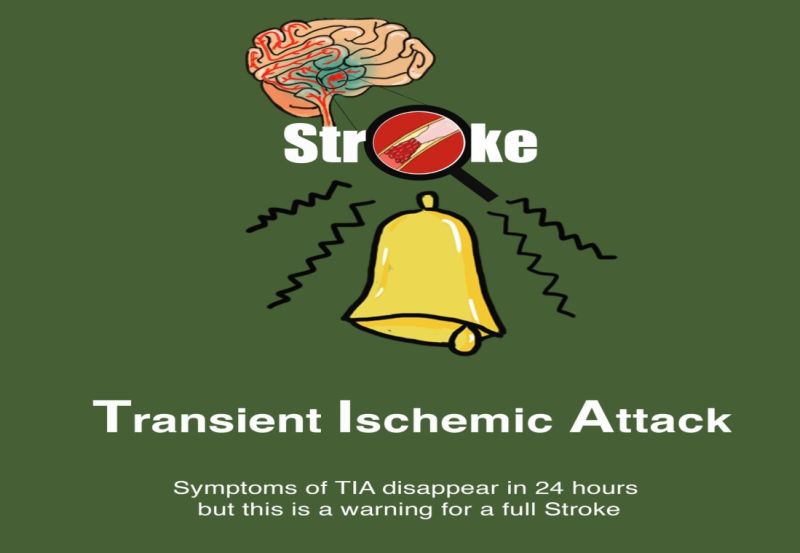TIA
I love caring for patients after TIAs, because the damage has not yet occurred, and we can intervene to prevent a stroke - Jodi Gehring MD

image by: BeAble Health
HWN Suggests
Deconstructing the “Mini-Stroke”
A TIA is not a stroke because damage is avoided. A stroke is not a TIA because brain damage has occurred. I like to refer to a TIA as an almost-stroke as opposed to a mini-stroke...
Sometimes patients may refer to a stroke with relatively mild deficits as a “mini-stroke” to distinguish it from a stroke that leaves someone externally and obviously disabled. This is also inaccurate. I have seen patients without a single physical visible deficit from a stroke who are significantly disabled from the cognitive impairment that frequently occurs following a brain injury.
Resources
 My brush with a stroke
My brush with a stroke
Stroke statistics indicate that 1 in 3 people who experience a TIA are likely to suffer a full-blown stroke, so I am now a member of a select club whose membership I never sought, but whose rules it would be wise to follow – adopt a healthier lifestyle; have slightly lower than normally acceptable levels of LDL-cholesterol (100 mg/dl are acceptable levels in general; with a history of TIA/stroke, recommended levels are <=70 mg/dl); and take a baby aspirin once a day. Perhaps the only mark a TIA leaves is this club membership, and a recollection of the unreal nature of what transpired during it.
 Recent advances in the management of transient ischemic attacks
Recent advances in the management of transient ischemic attacks
Significant advances in our understanding of transient ischemic attack (TIA) have taken place since it was first recognized as a major risk factor for stroke during the late 1950's. Recently, numerous studies have consistently shown that patients who have experienced a TIA constitute a heterogeneous population, with multiple causative factors as well as an average 5–10% risk of suffering a stroke during the 30 days that follow the index event.
Transient ischaemic attacks: mimics and chameleons
Suspected transient ischaemic attack (TIA) is a common diagnostic challenge for physicians in neurology, stroke, general medicine and primary care. It is essential to identify TIAs promptly because of the very high early risk of ischaemic stroke, requiring urgent investigation and preventive treatment. On the other hand, it is also important to identify TIA ‘mimics’, to avoid unnecessary and expensive investigations, incorrect diagnostic labelling and inappropriate long-term prevention treatment.
A New Focus on Aspirin in Preventing Strokes
The drug may play a more important role than previously thought.
Five things you should know about transient ischemic attacks
Often referred to as a “mini-stroke,” a Transient Ischemic Attack (TIA) may actually be a warning sign for a future stroke.
Health Matters: A New Stroke Strategy
Aggressive treatment of mini-strokes could help prevent major attacks.
Outpatient management of transient ischaemic attack
Primary care physicians play an important role in the prevention of subsequent stroke by managing vascular risk factors, encouraging patients to adopt lifestyle measures (e.g. exercise, diet and smoking cessation) and continuing antiplatelet therapy (or anticoagulation for those with atrial fibrillation).
There's No Such Thing as a Mild, Harmless Stroke
New research out of Canada shows survivors of transient attacks may be living with hidden disabilities, like vision problems, depression.
TIA Risk Calculator
Have you had symptoms that might be from a mini-stroke or transient ischemic attack (TIA)?. Answer the questions... to see what your risk of stroke or TIA might be as compared to others who have answered the same questions.
Transient Ischemic Attack: Why You Should Worry
They’re often called “mini-strokes,” but they’re not necessarily mini. A transient ischemic attack (TIA) is a serious warning sign that you could have a stroke in the next two days. Symptoms come on very suddenly...
 Deconstructing the “Mini-Stroke”
Deconstructing the “Mini-Stroke”
To describe a TIA as a “mini-stroke” misses the difference between the two terms. A TIA is not a stroke because damage is avoided. A stroke is not a TIA because brain damage has occurred. I like to refer to a TIA as an almost-stroke as opposed to a mini-stroke. Throughout the lifetime of this blog, I will continuously refer to TIAs as almost-strokes.
A Place for Mom
Known as a “warning stroke,” a transient ischemic attack (TIA) often comes and goes so quickly that the affected person may not even be aware they’ve had one. Yet medical experts stress it is vitally important for a person who has suffered a TIA to get immediate medical attention, because a TIA is a sign that the person is more likely to subsequently suffer a full stroke.
eMedicinehealth
TIAs are often warning signs of a future stroke. The risk of a stroke increases dramatically in the days and weeks after a transient ischemic attack, and the TIA may offer an opportunity to find a cause and prevent the permanent neurologic damage that results because of a stroke.
MayoClinic
Even though a transient ischemic attack doesn't last very long and leaves no permanent effects, it's far from an insignificant event. About one in three people who have a transient ischemic attack eventually have a stroke, with about half occurring during the year after the transient ischemic attack.
MedlinePlus
A transient ischemic attack is a "mini-stroke" caused by temporary disturbance of blood supply to an area of the brain, which results in a sudden, brief decrease in brain function.
National Institute of Neurological Disorders and Stroke
A transient ischemic attack (TIA) is a transient stroke that lasts only a few minutes. It occurs when the blood supply to part of the brain is briefly interrupted.
UpToDate
The risk of stroke after a TIA is highest in the first few days to weeks after the TIA. For example, the risk of having a stroke in the first two days after TIA has been estimated to be 4 to 10 percent. People with certain characteristics are thought to have a higher risk (eg, closer to 10 percent) of stroke compared to people without these characteristics.

Introducing Stitches!
Your Path to Meaningful Connections in the World of Health and Medicine
Connect, Collaborate, and Engage!
Coming Soon - Stitches, the innovative chat app from the creators of HWN. Join meaningful conversations on health and medical topics. Share text, images, and videos seamlessly. Connect directly within HWN's topic pages and articles.
















